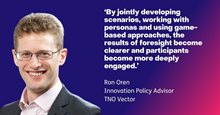
Digital innovation for a resilient and agile events industry
When COVID-19 restricted our movements and social distancing became the norm, the events sector was hit hard; without support, many organisations would not have survived. This raised an important question within the sector. How can event organisers and operators, from business and public events to culture and sports, become agile enough to withstand future shocks? Part of the answer lies in digitalisation, according to a recently finalised exploratory research project that TNO Vector conducted in collaboration with FieldLab Events and a broad set of stakeholders from the events sector.
Research on trends and the future outlook of the events industry
If there is one thing we know, it’s that the events industry is incredibly diverse. On one end you have pioneering companies that are on the cutting edge of technology, while others believe in a more traditional approach. Plus everything in between.
FieldLab Events approached the team at TNO Vector to collaborate on mapping the event trends of today, and to look into the future of the events industry (up to 2030).
The ultimate goal? To offer businesses across the board in the events industry a guideline for the future, so they aren’t caught out by new major shocks such as COVID-19.
"To ensure the viability of the events industry, even in the event of a new lockdown, we commissioned TNO Vector to conduct research. They mapped out the trends and digital innovations for the events sector, aiming for a healthy economic and social future."
Dimitri Bonthuis, member of the program team at FieldLab Events (ABN AMRO Open, F1)
Translating visionary research into real-life options
What do we expect the events world to look like in 2030? Will extended reality become commonly accepted? How will AI, robotics and the IoT be implemented? Which technologies will work and which ones won’t be viable until much later? And how will the societal changes, for instance on inclusiveness, sustainability, labour force, multi-culturalism, etc. play into this?
These were some of the questions the researchers at TNO Vector sought to answer in this project. After all, once you know what to expect, the pieces of this complex puzzle can be put together more logically.
As part of this project, TNO Vector has explored the visions of the future for the events industry and has translated the insights into practical recommendations. The outcomes offer individual businesses tools and direction in their pursuit for a sustainable future.
Maarten Schram, Managing Director of FieldLab Events (IDEA, LiveCom Alliance), on the project: "The value of this study is that it gives a very broad view of the technological possibilities, which people from every part of the events industry can draw inspiration from.”
Making future events relevant through scenarios
Technology is already deeply integrated in today’s events world. Just think of goal-line and hawk-eye technology in sports, real-time F1 driving stats, holographic music concerts, and so on. And future digital techniques will allow us to immerse ourselves even deeper. For the industry, it’s another exciting way to stay relevant and generate revenue.
The challenge for many organisers is to advance the technological entertainment value while maintaining the personal connection. Balancing the thrill factor with the human factor is therefore key, and differs per event. To demonstrate how digital solutions might support the events industry in the future, TNO Vector ‘thought up’ different plausible scenario’s that employ new technology to give events an extra dimension.
Just imagine a Caribbean beaming festival with live performances in Rotterdam, which one family living on both sides of the Atlantic can enjoy together using augmented reality, as if they are standing right next to each other. Or a business conference supported by AI that generates a personalised program and guides you through all details of the event, so delegates with a busy schedule can optimally communicate and connect in a combined physical and virtual setting.
Recommendations for a future-proof events industry
In an industry that is constantly evolving, digital innovations will continue to be used as soon as they become available. It is impossible to know exactly what the industry will look like in 2030, as the sector is susceptible to trends. TNO Vector therefore focused on the ‘dot on the horizon’ based on industry insights.
An analysis was made to determine to what extent digital innovations that are, or become available up to 2030, can help the industry respond to trends and remain viable during major market disruptions. And finally, the researchers formulated recommendations to increase the innovative capacity and agility of the events industry.
The four main recommendations are:
- To respond with one voice to major government announcements and decisions, and to proactively communicate the industry’s needs;
- Stimulate the collaboration by setting up a digital partnership platform;
- Appoint a central data expertise team that all members can approach for practical advice;
- Work together to create a long term strategy for the event sector.
An important achievement of this exploratory research project, which ran from July 2022 to July 2023, is that it inspires people in the events industry to explore digital technologies, while giving direction to individual companies in the labyrinth of digital opportunities.
In addition, it offers routes to strengthen the resilience of businesses and supports the industry as a whole to utilise the full potential of digital technology.



